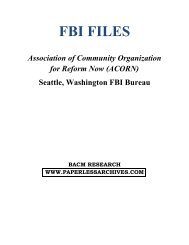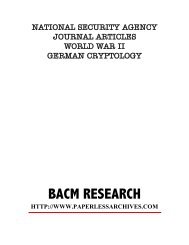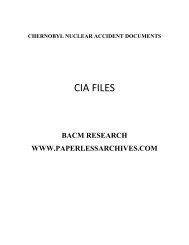- Page 1:
CHERNOBYL NUCLEAR ACCIDENT DOCUMENT
- Page 4 and 5:
About BACM Research - PaperlessArch
- Page 6 and 7:
days, so they left nearly everythin
- Page 8 and 9:
The 1986 Report of the U.S. Departm
- Page 10:
S. Hrg. 99-869 THE CHERNOBYL ACCIDE
- Page 13 and 14:
COMMITTEE ON ENERGY AND NATURAL RES
- Page 16 and 17:
BOSTON PUBLIC LIBRARY THE CHERNOBYL
- Page 18 and 19:
statement of Senator J. Bennett Joh
- Page 20 and 21:
We will contiue to work to make nuc
- Page 22 and 23:
. - the foreign reactor market that
- Page 24 and 25:
STATEMENT OF HON. HOWARD M. METZENB
- Page 26 and 27:
11 with the wrong report. He came u
- Page 28 and 29:
13 The residents of the state of Oh
- Page 30 and 31:
15 Yes, I am not satisfied with eve
- Page 32 and 33:
17 We accomplished our work by coll
- Page 34 and 35:
19 Senator Metzenbaum. Mr. Chairman
- Page 36 and 37:
21 The work of the Task Force was t
- Page 38 and 39:
23 On May 3 the State Department se
- Page 40 and 41:
25 The first elevated levels of rad
- Page 42 and 43:
27 8 Foreign data received suggeste
- Page 44 and 45:
29 By way of comparison, you might
- Page 46 and 47:
31 - 2 - around the world. In the i
- Page 48 and 49:
33 4 - In addition to these meeting
- Page 50 and 51:
35 - 6 radiological release mechani
- Page 52:
37 DESCRIPTION OF THE CHERNOBYL SIT
- Page 55 and 56:
40 SIX OPERATING PUMPS (8 PUMPS TOT
- Page 57 and 58:
42 .'ill a* O > S 2s5Sg sxs.f 2-53
- Page 61 and 62:
46 10 I. 3 c o u .>$ «o
- Page 63 and 64:
48 12 H
- Page 65 and 66:
50 14 SUPPRESSION POOL ARRANGEMENT
- Page 67 and 68:
52 16 SOURCES OF ENVIRONMENTAL DATA
- Page 69 and 70:
54 18 EXTRAPOLATION FACTORS (BACK T
- Page 71 and 72:
56 20 FUTURE PLANS PREPARE REPORT I
- Page 73 and 74:
58 The Department's Nuclear Safety
- Page 75 and 76:
60 STATEMENT OF MARY L. WALKEK ASSI
- Page 77 and 78:
62 to minimize and manage risks so
- Page 79 and 80:
64 Third, the United States nuclear
- Page 81 and 82:
66 The priority the Department plac
- Page 83 and 84:
68 of the reactor core melted. Unli
- Page 85 and 86:
70 Introduction As a member of the
- Page 87 and 88:
72 questions concerning fuel behavi
- Page 89 and 90:
74 While each of these areas are pa
- Page 91 and 92:
76 promises to be able to demonstra
- Page 93 and 94:
78 The Chairman. Thank you. Dr. Bun
- Page 95 and 96:
80 The most important actions we ca
- Page 97 and 98:
82 Nonetheless, I will try to recou
- Page 99 and 100:
84 I doubt If I can today convert e
- Page 101 and 102:
86 All of our eggs are In the baske
- Page 103 and 104:
88 8 safety margins and more fall -
- Page 105 and 106:
90 10 The existing emergency planni
- Page 107 and 108:
92 12 Further, If we want to ensure
- Page 109 and 110:
94 14 never survive the kind of pro
- Page 111 and 112:
96 firmed, but at least suspected t
- Page 113 and 114:
The Chairman. If we were to 98 have
- Page 115 and 116:
100 2 THE FACT OF THE MATTER IS, MR
- Page 117 and 118:
102 THE SOVIET UNION ALSO AGREED TH
- Page 119 and 120:
104 6 MR. CHAIRMAN, IT WILL DO US L
- Page 121 and 122:
106 12 tific developments. includin
- Page 123 and 124:
108 14 The participating States a^^
- Page 125 and 126:
no speculation in the press that it
- Page 127 and 128:
112 than the Soviet Union. They hav
- Page 129 and 130:
114 We find that as a glimmer that
- Page 131 and 132:
116 Mr. Denton. I don't have that a
- Page 133 and 134:
118 My next question is what is the
- Page 135 and 136:
120 Mr. Meyers. These are the Easte
- Page 137 and 138:
122 Los Anpeles Times, 5/22/86 Radi
- Page 139 and 140:
124 us trig au m ifistead of a u to
- Page 141 and 142:
126 have it go through a peer revie
- Page 143 and 144:
128 Mr. Meyers. Mr. Chairman, may I
- Page 145 and 146:
130 -2- The health assessment subgr
- Page 147 and 148:
— 132 and ask my questions. If he
- Page 149 and 150:
134 Mr. Denton. I do not think they
- Page 151 and 152:
136 Senator Melcher. To clarify you
- Page 153 and 154:
^ 138 human error then, leading to
- Page 155 and 156:
140 are 25 BWR units with Mark I co
- Page 157 and 158:
142 engineering safeguards for ther
- Page 159 and 160:
144 STATEMENT SUBMITTED FOR THE REC
- Page 161 and 162:
146 2 - Process Heat for the chemic
- Page 163 and 164:
. 148 - ^ THE HEAT IS TRANSPORTED B
- Page 165 and 166:
150 Senator Domenici. Mr. Taylor, w
- Page 167 and 168:
152 Of that, over the many, many ye
- Page 169 and 170:
154 statement to Senate Committee o
- Page 171 and 172:
. 156 have become vital and continu
- Page 173 and 174:
158 NRC and our industry to produce
- Page 175 and 176:
s" 160 on the facts and to ensure t
- Page 177 and 178:
. 162 the fuel elements and light w
- Page 179 and 180:
164 generations of RBMK designs to
- Page 181 and 182:
166 • Third, the design appears t
- Page 183 and 184:
168 and ramifications of flow and h
- Page 185 and 186:
— 170 Senator Domenici. Thank you
- Page 187 and 188:
172 Soon we will have seen a fivefo
- Page 189 and 190:
174 Testimony to the Energy and Nat
- Page 191 and 192:
176 o The June 1986 folder entitled
- Page 193 and 194:
178 Corporate Evaluations Evaluatio
- Page 195 and 196:
180 EVENT ANALYSIS AND INFORMATION
- Page 197 and 198:
182 accessible from remote terminal
- Page 199 and 200:
184 o INPO has also developed good
- Page 201 and 202:
186 Members of the full Board are l
- Page 203 and 204:
. 188 NATIONAL ACADEMY FOR NUCLEAR
- Page 205 and 206:
" 190 o In May and June of 1985, th
- Page 207 and 208:
192 identified during INPO evaluati
- Page 209 and 210:
194 increased awareness at all leve
- Page 211 and 212:
196 o Collective radiation exposure
- Page 213 and 214:
198 Establishment of these long-ter
- Page 215 and 216:
200 Senator Domenici. Thank you, ve
- Page 217 and 218:
202 STATEMENT SUBMITTED FOR THE REC
- Page 219 and 220:
. 204 -2- capacity, and has long be
- Page 221 and 222:
206 • 4- Temperature Stability Th
- Page 223 and 224:
208 In addition. It also appears th
- Page 225 and 226:
210 Senator Domenici. Thank you. Dr
- Page 227 and 228:
212 The billions of dollars per yea
- Page 229 and 230:
214 As a nuclear physicist who has
- Page 231 and 232:
216 industry and strong reaction fr
- Page 233 and 234:
218 -5- Nevertheless, despite our o
- Page 235 and 236:
220 Citizen groups are going to int
- Page 237 and 238:
] 222 -9- Footnotes and References
- Page 239 and 240:
224 THE BULLETIN OF THE ATOMIC SCIE
- Page 241 and 242:
226 clear power plants since 1975
- Page 243 and 244:
228 Jan Beyea, a physicist, is a se
- Page 245 and 246:
230 ... a filtered vent system coul
- Page 247 and 248:
232 It is possible that it will tak
- Page 249 and 250:
234 Senator Domenici. I appreciate
- Page 252 and 253:
APPENDIX Responses to Additional Co
- Page 254 and 255:
. . 239 A2 . As noted above, we wou
- Page 256 and 257:
241 QUESTION 1. Some people have sa
- Page 258 and 259:
243 QUESnON_l. (Continued) 3 - For
- Page 260 and 261:
245 QUESTION C.tt . What do we know
- Page 262 and 263:
247
- Page 264 and 265:
: 249 -S-Vi9S>-ftv\.S>6)N^>^ -^'S^V
- Page 266 and 267:
251 QUESTION 2. (Continued) - 2 - P
- Page 268 and 269:
253 fiU E S no N_2 . (Continued) -
- Page 270 and 271:
255 QUESTION 3 . Just to set the re
- Page 272 and 273:
257 QUESTION 5. If you were to choo
- Page 274 and 275:
259 2UEST|0N_5. (Continued; 3 - Fir
- Page 276 and 277:
261 SMilII2!!_Z- ^° "^ "°" ^^^^ ^
- Page 278 and 279:
263 SMilllO^l-^- You attended the I
- Page 280 and 281:
I A 265 QU E ST 1 N_ 1 , year ago,
- Page 282 and 283:
267 QUESTION 10. (Continued) 3 - in
- Page 284 and 285:
269 QUESTION 10. (Continued) - 5 Wi
- Page 286 and 287:
271 QUESTION 10. (Continued) - 7 su
- Page 288 and 289:
I 273 QUESTION 10. (Continued) - 9
- Page 290 and 291:
: i 275 QUESTION 11. (Continued) -
- Page 292 and 293:
277 QUESTION 12. (Continued) - 2 -
- Page 294 and 295:
279 QUESTION 1 2. (Continued) - 4 -
- Page 296 and 297:
281 UNITED STATES NUCLEAR REGULATOR
- Page 298 and 299:
283 g U E S T 1 N 13. What are the
- Page 300 and 301:
I 285 POST-HEARING QUESTIONS AND AN
- Page 302 and 303:
287 2 maintained current. Computer
- Page 304 and 305:
289 QUESTIONS FROM CHAIRMAN JAMES A
- Page 306 and 307:
291 QUESTIONS FROM CHAIRMAN JAMES A
- Page 308 and 309:
293 QUESTIONS FROM CHAIRMAN JAMES A
- Page 310 and 311:
295 QUESTIONS FROM CHAIRMAN JAMES A
- Page 312 and 313:
297 -2- Answer 7 (continued): posse
- Page 314 and 315:
299 -2- Answer 8 (continued): The S
- Page 316 and 317:
301 -2- Answer 9 (continued): The f
- Page 318 and 319:
303 Answer 10 j. -- xu (continued):
- Page 320 and 321:
305 nUESTION FROM CHAIRMAN JAMES A.
- Page 322 and 323:
307 QUESTION FROM CHAIRMAN JAMES A.
- Page 324 and 325:
309 Answer 14 (continued); 2. Early
- Page 326 and 327:
311 Answer 15 (continued): verifica
- Page 328 and 329:
313 -2- Answer 16 (continued): Desi
- Page 330 and 331:
315 -2- Answer 17 (continued): forc
- Page 332 and 333:
317 POST-HEARING QUESTIONS AND ANSW
- Page 334 and 335:
319 2 b. By legislation, existing D
- Page 336 and 337:
321 Question 3: Has the DOE designe
- Page 338 and 339:
, 323 JAMU A. WeCLUW. OAHO. CHAMHAN
- Page 340 and 341:
PROF. DR. RUDOLF SCHULTEN Direklor
- Page 342 and 343:
327 Questions from Senator Wallop 1
- Page 344 and 345:
329 i-ooi trnl Electric Power Resea
- Page 346 and 347: : 331 J. A. McClure -2- July 08, 19
- Page 348 and 349: 333 J, A. McClure -4- July 08, 1986
- Page 350 and 351: .. 335 ES, TUESDAY. JUNE 3. 1986 NE
- Page 352 and 353: 337 INPO RESPONSES TO QUESTIONS BY
- Page 354 and 355: 339 Answer: INPO's strength is in i
- Page 356 and 357: SAN 341 SENATE COMMITT-E ON F'-'fm;
- Page 358: 343 Answer There is wide participat
- Page 364: S. Hrg. 102-765 EFFECTS OF THE ACCI
- Page 367 and 368: ,,0S10H PUBUC UBRWV- COMMITTEE ON E
- Page 370 and 371: EFFECTS OF THE ACCIDENT AT THE CHER
- Page 372 and 373: It is clear that the remaining RBMK
- Page 374 and 375: the Federal prosecutor of the USSR
- Page 376 and 377: With growing urgency, the Ukrainian
- Page 378 and 379: We did check soil samples and radia
- Page 380 and 381: 11 the cancer registry data in gene
- Page 382 and 383: 13 we are medical investigators and
- Page 384 and 385: 15 standard of medical diagnostic a
- Page 386 and 387: 17 nobyl. An American-Ukrainian Med
- Page 388 and 389: 19 The temperatures, however, were
- Page 390 and 391: 21 down on the kind of horizontal p
- Page 392 and 393: 23 those who got, shall we say, bla
- Page 394 and 395: 25 Well, in the May 1992 issue of t
- Page 398 and 399: 29 — physicians that come in. Bec
- Page 400 and 401: 31 tumor registries together. There
- Page 402 and 403: 33 like on the 1st of January 1995
- Page 404 and 405: 35 Ukraine, and two in Lithuania. T
- Page 406 and 407: 37 the training of the operators, e
- Page 408 and 409: 39 issue. The directions that the w
- Page 410 and 411: 41 Further, there is no easy way of
- Page 412 and 413: 43 I thank you for your attention.
- Page 414 and 415: 45 • WERs that have not been turn
- Page 416 and 417: 47 thank you for convening this hea
- Page 418 and 419: I am am 49 INTRODUCTION My name is
- Page 420 and 421: 1 . 51 The Ukrainian Ministry of He
- Page 422 and 423: 53 information on the actual doses
- Page 424 and 425: 55 First, it is well known that wit
- Page 426 and 427: 57 1) The U.S. Government should in
- Page 428 and 429: 59 Level of malignant tumors of Lym
- Page 430 and 431: 61 Level of Malignant Diseases amon
- Page 432 and 433: 63 The Level of non-malignant hemat
- Page 434 and 435: 65 The Children of Chornobyl Relief
- Page 436 and 437: 2 67 TB8TIMOHT Of rr«d K, MattlMT,
- Page 438 and 439: pnxlucing ihere 69 Pan H 4. Public
- Page 440 and 441: • , t ( (iiiiiii i M 71 P«n H ev
- Page 442 and 443: 73 TESTIMONY OF WLADIMIR WERTELECKY
- Page 444 and 445: . 75 education. The same comprehens
- Page 446 and 447:
77 Should epidemics and other medic
- Page 448 and 449:
. 79 Massive psychological effects
- Page 450 and 451:
81 American-Ukrainian Medical Scien
- Page 452 and 453:
83 circumstances in Ukraine, there
- Page 454 and 455:
85 flep:acaBHa AyMa yKpaiHM Kojieri
- Page 456 and 457:
I I 87 C.KHOliA (DMKl'AHUI Mxl'AIlK
- Page 458 and 459:
89 MiHiCTepCTBO OXOpOKH 3flopoB'a P
- Page 460 and 461:
. 91 m XAPKIBCbKA OBflACHA AEP>«AB
- Page 462 and 463:
93 U.S. Senate Committee on Environ
- Page 464 and 465:
95 What Happened The Chernobyl acci
- Page 466 and 467:
97 -? 15 U) (0 < Figure 1. Estimate
- Page 468 and 469:
99 form lava.' This material ran th
- Page 470 and 471:
101 V) S O aċo V) (A « aQ. 3 W f
- Page 472 and 473:
103 Unit 4 of ChernoSvt A'PP after
- Page 474 and 475:
105 3 O) (0 £ Q. O o
- Page 476 and 477:
107 •M E Mr -n. 136 \sss .4U>-^
- Page 478 and 479:
109 Natural processas of decay have
- Page 480 and 481:
Ill Clean up actions should be take
- Page 482 and 483:
113 those involved in 1986 and part
- Page 484 and 485:
115 Prepared Statement of Murray Fe
- Page 486 and 487:
117 with those who are classified a
- Page 488 and 489:
119 economies. Economic chaos and h
- Page 490 and 491:
121 Table 1.—Operating Reactors i
- Page 492 and 493:
123 FORMULA FOR FUNDING American as
- Page 494 and 495:
125 their transition to a new forms
- Page 496 and 497:
127 Table 1.—Cost Estimate—Cont
- Page 498 and 499:
129 Nuclear Materlai;s Management U
- Page 500 and 501:
131 Weeks Seven and Eight—Prelimi
- Page 502 and 503:
133 Four sets dictation and transcr
- Page 504 and 505:
. Develop 135 Ukrainian entrepreneu
- Page 506 and 507:
137 be achieved during the first ph
- Page 508 and 509:
139 tion measures. As required, the
- Page 510 and 511:
141 and services. The laboratory wi
- Page 512 and 513:
143 The reactor vessel, primary shi
- Page 514 and 515:
145 • fixation, • restrictions
- Page 516 and 517:
147 environmental compartment to an
- Page 518 and 519:
149 In order to plan for and accomp
- Page 520 and 521:
151 4.1.2.2 Ground Water Contaminat
- Page 522 and 523:
— 153 should provide direction on
- Page 524 and 525:
— 155 relative sensitivity of the
- Page 526 and 527:
. . and . . they 157 ( Prepared Sta
- Page 528 and 529:
. . and 159 generator. The result i
- Page 530 and 531:
161 5 mln hectares of agricultural
- Page 532 and 533:
' 163 Not only Ukraine, but the who
- Page 534 and 535:
165 taking forceful steps to help c
- Page 536 and 537:
167 late seventies." ^° Although t
- Page 538 and 539:
169 actors; this information gap ma
- Page 540 and 541:
171 To encourage this implementatio
- Page 542 and 543:
173 production is solid fuels, eith
- Page 544 and 545:
175 the energy efficiency of the ec
- Page 546 and 547:
177 ' Because closing costs will in
- Page 548 and 549:
. May BOSTON PUBLIC LIBRARY ..Hopki
- Page 550 and 551:
BOSTON PUBLIC LIBRARY 9999 U^/ 0275
- Page 554:
. 'HE LEGACY OF CHORNOBYL 1986 TO 1
- Page 557 and 558:
COMMISSION ON SECURITY AND COOPERAT
- Page 560 and 561:
THE LEGACY OF CHORNOBYI^1986 TO 199
- Page 562 and 563:
— The Helsinki Commission is very
- Page 564 and 565:
and its Belarus but any single coun
- Page 566 and 567:
Over 10 years after the events, I c
- Page 568 and 569:
Mr. Smith. Thank you very much, Mr.
- Page 570 and 571:
— 11 If you look at standardized
- Page 572 and 573:
13 births. We find it difficult to
- Page 574 and 575:
15 leagues have made a long-term co
- Page 576 and 577:
17 7's commitment? Of the assistanc
- Page 578 and 579:
19 burg is not too far. Greographic
- Page 580 and 581:
21 Mr. Smith. Dr. Feshbach, can you
- Page 582 and 583:
23 One of the problems with the Int
- Page 584 and 585:
25 Mr. KuzMA. There's quite a large
- Page 586 and 587:
— 27 bombardment of low-level rad
- Page 588 and 589:
29 are proposals that Kyiv be procl
- Page 590 and 591:
31 good people there, everywhere, a
- Page 592 and 593:
33 Only one percent of the territor
- Page 594 and 595:
35 an extent possible the consequen
- Page 596 and 597:
37 up of the Consequences of the Ac
- Page 598 and 599:
39 Ukrainian people realized that t
- Page 600 and 601:
41 presses the brake pedal to slow
- Page 602 and 603:
43 The "Sarcophagus" facility was t
- Page 604 and 605:
45 8 Rivers and lakes in the vicini
- Page 606 and 607:
47 10 According to maximum estimati
- Page 608 and 609:
49 12 Immediately after the acciden
- Page 610 and 611:
51 14 experienced radiation doses t
- Page 612 and 613:
53 16 ECONOMIC CONSEQUENCES Over th
- Page 614 and 615:
55 18 LEGISLATION ON CHORNOBYL The
- Page 616 and 617:
57 20 children affected by the Cher
- Page 618 and 619:
59 22 - ensuring proper infrastruct
- Page 620 and 621:
61 24 private religious, non-profit
- Page 622 and 623:
63 26 environmental effects of radi
- Page 624 and 625:
65 STATEMENT BY ALEXANDER B. KUZMA
- Page 626 and 627:
67 uncontaminated. Two weeks ago, a
- Page 628 and 629:
69 towards other health concerns ex
- Page 630 and 631:
71 the enoimity of the task that li
- Page 632 and 633:
73 Testimony of Dt. Natalia Lakiza-
- Page 634 and 635:
75 About 5 mln people continue to l
- Page 636 and 637:
77 Changes in the childbearing func
- Page 638:
79 - a possible many-fold increase
- Page 643:
This is a U.S. Government publicati
















